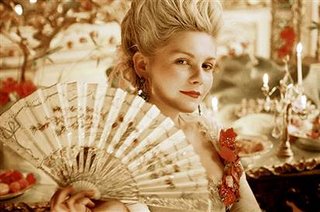
Opening on a static shot of the young princess supine on a chaise longue, wrapped in lace and surrounded by cakes, Sofia Coppola’s third feature, a kind of dreaming biopic of France’s ill-fated Marie Antoinette confounds expectations, being empty and superficial, but impossible to hate for all that. High-born in Austria, the innocent Marie (gracefully played by a childlike Kirsten Dunst) is married off to the shy Dauphin Louis XVI (Jason Schwartzman) in a match arranged between her domineering mother Maria Teresa (Marianne Faithfull) and the King of France (Rip Torn). Making the journey by coach to Versailles, the young princess is stopped at the border, in the first of Coppola’s more complicated and emotionally resonant scenes, to be divested of everything she owns, including her friends and her beloved puppy. On arriving at Versailles, the teenage princess is astonished at the opulent luxury of the court and troubled by the constant gossip and seemingly endless, incomprehensible protocol.
After the wedding, and the young couples first night together (blessed by a bishop, watched by a crowd) Marie is pressured into creating heirs, a process that turns into a competition with her sister-in-law, but stymied by young Louis seeming disinterest in sex. He’d much rather go hunting or read about locks and keys. Surrounded by ladies-in-waiting, led by the lemon-faced Comtesse De Noailles (Judy Davis) young Marie must follow an unbending regime, heading up processions of her courtiers; a constant movement through the court to pre-set destinations following a strict timetable. When her coterie fight over who is given the privilege of dressing her in the morning, like a doll, Marie protests that the treatment is “ridiculous”. “This, Madame, is Versailles”, she is told and that is the answer to everything.
The daily life of the court, from accounts in Antonia Fraser’s detailed biography, take up much of the middle section of the film; eating rituals, montages of spending sprees (on shoes and frocks), and Marie’s struggle against the insular society (personified by two backbiting Ugly Sisters, played by Molly Shannon and Shirley Henderson). With his father having died, young Louis ascends to the throne, but still spends most of his time hunting, leaving him “too exhausted” to consummate his marriage. These sections are deliberately drawn out, occupying the space where a narrative should be, but eloquently describe the tedium and routine of decadent nobility, tempered with the tang of futility and emptiness.
Coppola, who was given special permission to shoot at the Palace of Versailles, immerses herself in the splendour of the décor, with her cinematographer Lance Acord showing the influence of Kubrick’s Barry Lyndon both in the naturalistic lighting and his use of jarring symmetries. Much has been made of Coppola’s use of a new-wave 80s soundtrack (songs from New Order, Bow Wow Wow and Gang of Four play over the action, much as they might have done in Heath Ledger’s A Knight’s Tale) but soundtrack is just one element of the whole cinema, and her choices are never intrusive.
Without an heir, Marie’s situation is precarious; a fact she is reminded of in her mother’s regular admonishing letters, and the lectures delivered by her ambassador (a wry Steve Coogan). Later, her brother, the Emperor of Austria (Danny Huston in a cameo) arrives to lecture the distracted Louis about his husbandly duties and the two eventually have children. The third act has the increasingly rebellious Marie establish a hideaway in Versailles, a manicured rural idyll where she can raise her daughter and entertain her friends, including a half-imagined affair with a young Swedish soldier (Jamie Dornan). These episodes are languorously told, simple framed moments drawn out into lengthy sections, adding to the ethereal mood but short on drama, dialogue or incident. Critically, Coppola stops her story just at the point where the revolutionary mob (played mostly as noises off) are kicking in the door of the palace; preferring a poetic, symbolic bow on a balcony to showing the Queen’s final bow before Madame Guillotine.
Coppola is creating an atmosphere of understanding rather than a documentary, in order to create her own movie, an interpretation of historical events reconfigured to make a statement about class, privilege and duty. This is not Les Miserables, thankfully, and neither is it is a crusty history lesson or a complete fantasy, but lies somewhere in the middle. There is no doubt that the rich, well-connected Coppola empathises deeply with her subject and that is all she must do in order to succeed in making her film, the third in her series of young women trapped inside their own lives, as sleepy as The Virgin Suicides and remote as Lost in Translation, but far more maddeningly disconnected and narratively obtuse. Like the ever-present pastries, Marie Antoinette is lovely to look at but provides only poor nourishment.









5 comments:
Thanks for the thorough review. I just stumbled upon your site, and it reminded me of my father's enthusiasm for silent films. If you're interested you can find him at: http://dan-navarros-blog.blogspot.com/
Keep up the good work...it's not really a dump :)
thanks for the heads up to your fathers site Julie -
the 'dump' quote is from the coen bros. barton fink
Check out my amusing blog.
amusing for you, perhaps, darkman
I am an hour and a half in and finding it heavy going...zzz
Post a Comment